Q&A: Mat Hayman reflects on Paris-Roubaix victory
'Maybe I needed every one of those 15 years before I got it right'
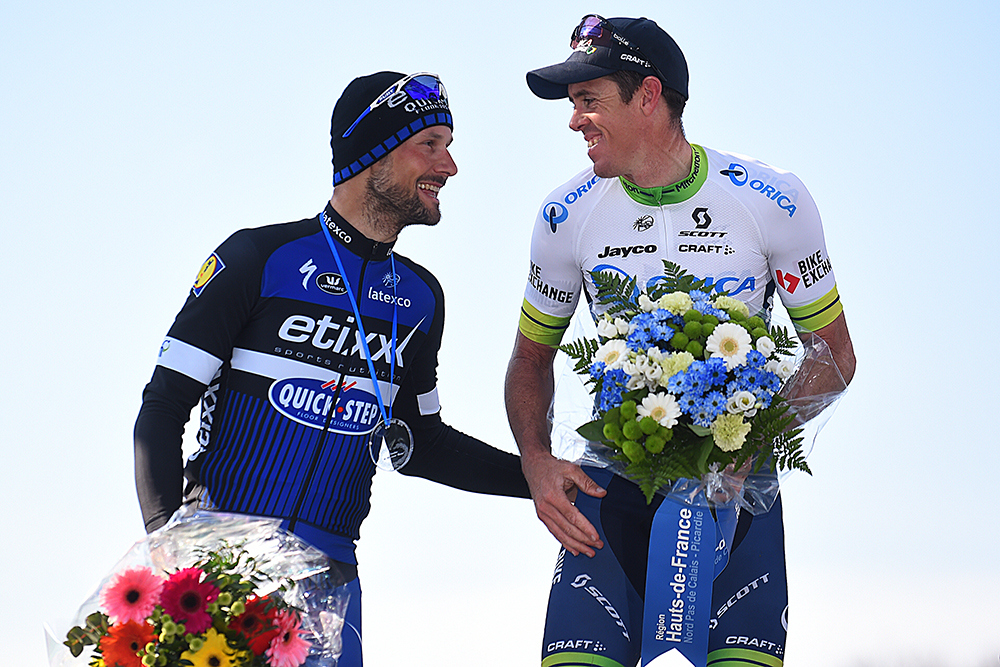
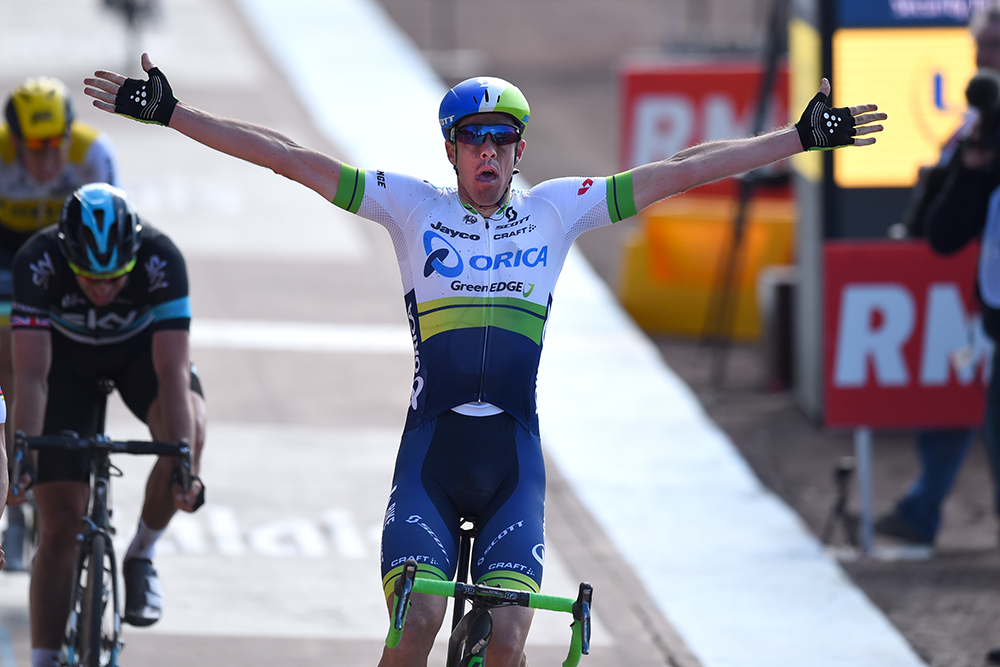
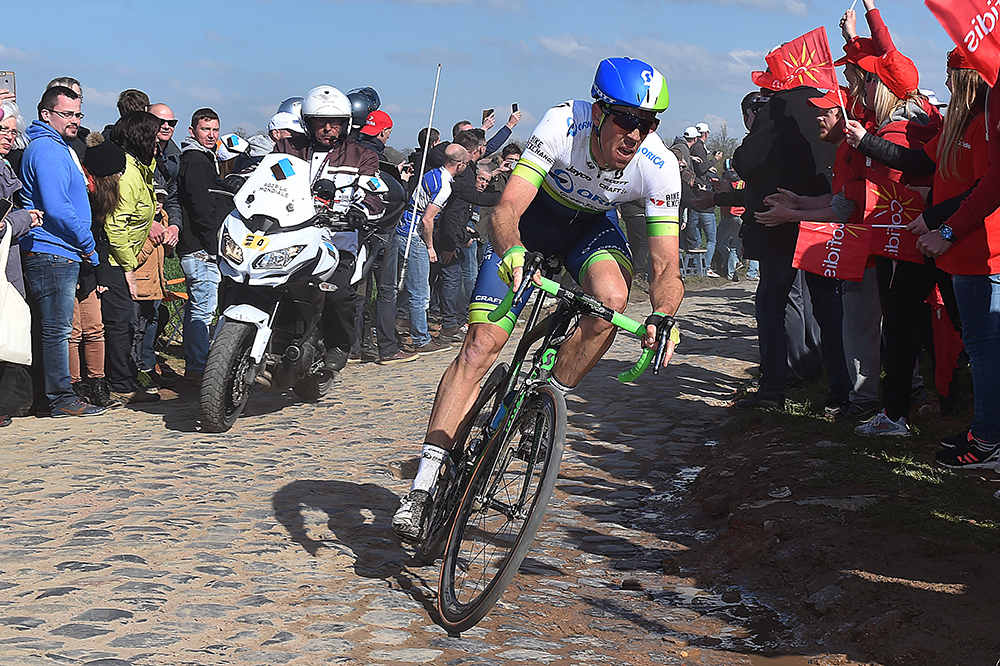
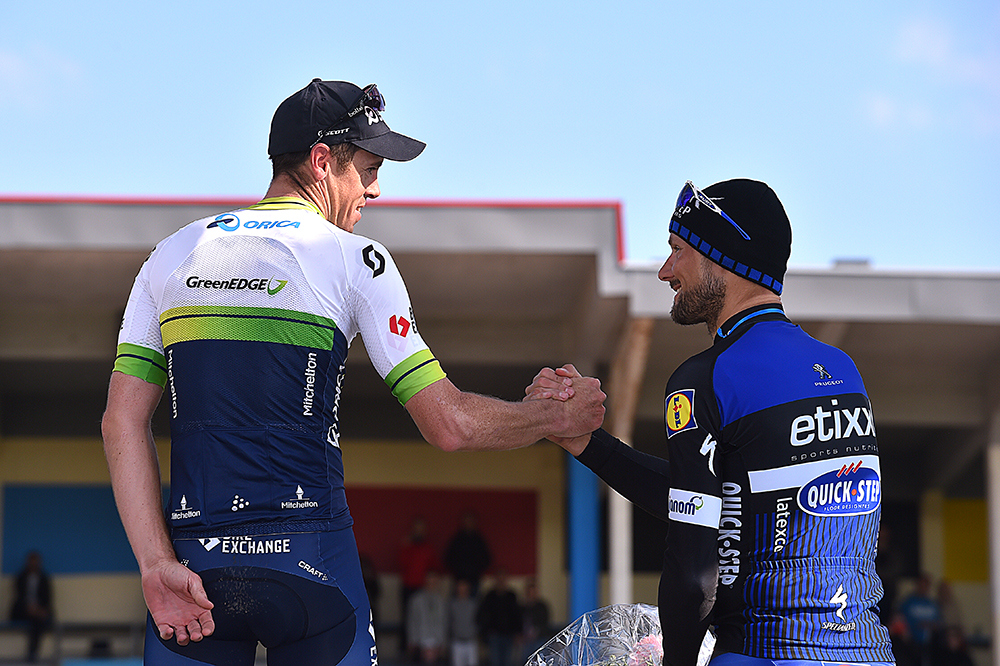
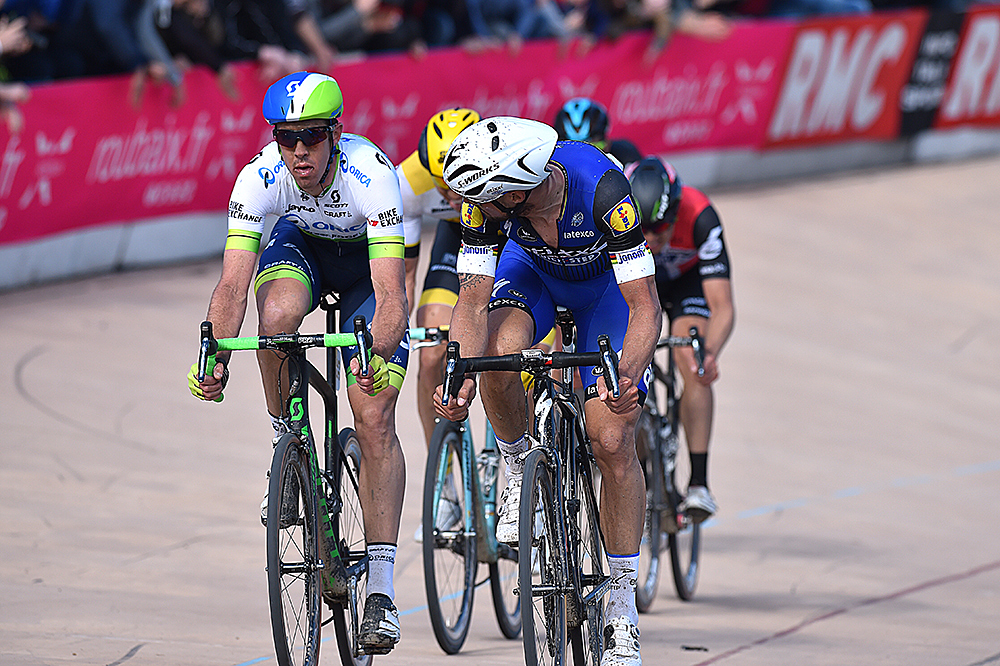
The day after Mat Hayman won Paris-Roubaix, he left Ghent where his Orica-GreenEdge team had been based to return to his Belgian home in Veldwezelt, Lanaken near the Dutch province of Limburg. He was just coming to terms with the enormity of his feat on Sunday.
However, Hayman, 37, had not missed the opportunity to enjoy the moment. The night before, the Australian celebrated the win with his teammates, the team staff and the volunteers they had recruited for the classics to provide drinks and spare wheels at various vantage points.
But despite the glow of being the Paris-Roubaix champion, Hayman knew that in his next scheduled race, Wednesday’s Brabantse Pijl in Belgium, he would be expected to resume his role as a team helper.
"I haven’t heard otherwise so it’s business as usual, and Wednesday I will be back on the start line at Brabantse Pijl," Hayman told Cyclingnews on the drive home, while the famed cobblestone trophy for winning Paris-Roubaix lay under the back seat of his car between a bottle of champagne and beer and under the winner’s bouquet.
"I normally only get one or two goes a year to ride for myself. Michael Matthews has run second there [Brabantse Pijl] two years in a row.
"That is one of his big targets. He is a big favourite. That’s fine with me. Hopefully I can carry this form in and he can get a big win that he has been looking to in that race. It’s something he really enjoys.”
But with his own achievement now starting to sink in – an achievement all the more remarkable considering he won after breaking his arm in February and only raced twice before Sunday, Hayman was happy to reflect further on his victory, and also talk of his hopes for the future.
Get The Leadout Newsletter
The latest race content, interviews, features, reviews and expert buying guides, direct to your inbox!
Rupert Guinness: This was your 15th Paris-Roubaix. People talk of how it can days to recover. Are you feeling sore, or are you ‘floating’ after having won the third of cycling’s five monuments?
Mat Hayman: Yeah … because I was able to win, everyone falls in a heap and I walk around like I haven’t even raced. It’s all the mental side of it. Normally I get to the end of that race and lay around like a beached whale in agony. But [on Sunday] I was also lucky or clever enough to put myself in that early break. I think I missed a lot of the hard racing when Tom Boonen broke the bunch up and those two groups were chasing each other for quite a long way. Tom made the race really long and really hard. I missed most of that. I only joined them when they got me at about 50km to go. I realised the last 10km that I was actually probably a bit fresher than the other guys.
RG: When Cadel Evans won the Tour de France in 2011, he said he felt it was the culmination of years of experience in the race – with all he had learned from the near-misses, the mishaps, the highs and lows and the whole thing. Is that how your win feels after 15 years?
MH: One hundred per cent. Sometimes having so much experience can almost be a negative because I have seen punctures on every section… It’s like I say, ‘I have punctured here once … ‘I have crashed over here once … Oh, this corner is a bit dangerous.’ But [on Sunday] it worked in my favour and I was confident in every move I made. Somehow I was able to get into the zone and the way I rode the last 15km I just seemed to be able to not do anything wrong and I was able to keep my cool. And because I was maybe that little fresher I was able to read the other guys a little bit better than I normally would. Sometimes I end up being the one who closes all the gaps and someone else wins and [on Sunday] the closer I got to the finish, the more they were marking each other and the longer I could save.
RG: When Evans won the Tour he was 34. You are 37. Should we look less at age being anything more than just two numbers?
MH: Through my injury and having the fracture in my arm and freshening right up, it just shows you that even at this old age the body can still perform at that level. Talking to some of the boys in the team, you realise how young they are and where they were when I turned professional and what they were doing. Sometimes [it is] a bit daunting. But I don’t feel it on the bike. I don’t feel it in the bunch. I feel like I am racing just as I ever was. Experience helps a lot and it’s something I have always liked, to work with the younger guys and pass [that experience] on. For me it all came together [on Sunday]. Maybe I needed every one of those 15 years before I got it right.
RG: What was the reaction to your win of the others? Tom Boonen who was chasing record fifth win, Ian Stannard who was third…
MH: I spoke with Tom on the podium. I have raced with Tom for many years. My local town [Veldwezelt in Lanaken] was quite proud of me, but for the rest of Belgium I think there was a huge sigh when he lost. He was going to take that record and go down in history and he had a bit of a comeback story himself, from such a hard crash in Abu Dhabi last year and breaking his skull. Everybody wanted to see him [win a fifth title] and he really did make the race. If I am honest, he had to win and I knew that. He was never going to settle for second. I was able to gamble. If someone went up the road, I was happy to go for second or third. That paid off in the end and I think the boys marked themselves out of the race. But … I was up with some pretty illustrious company there with Tom who is obviously fast, being a sprinter, Edvald Boasson Hagen, Ian … but I backed myself in the sprint. I have done a few lead outs and I have won a few sprints in my day. I was still pretty confident going in [to the finale].
RG: For the Ardennes classics and Sunday’s Amstel Gold Race, your win should give Orica-GreenEdge huge momentum, shouldn’t it?
MH: For sure. I was even thinking in the race [on Sunday how] how you used to say, ‘They are all just guys who get up in the morning and put one leg through one side of their pants and one leg through the other. We are all just equal.’ I think nothing more than that and that the guys [will] go, ‘Wait a minute … I trained with Hayman all the time. If he can do it, I can do it.’ That’s what happens. The guys look around and say, ‘Wait a minute, I know I am capable of what he is,’ and I think we can all lift. [The] Amstel Gold is the one [classic] we are almost expected to win and it is the one that we haven’t won. We have been so close on so many occasions. That’s a pressure race for the team. In ways, when we won Milan-San Remo and Liege-Bastogne-Liege it was unexpected, just like Roubaix. So it is [about] going in with a different mentality. Hopefully the team can step up.
RG: Your head is rightly in classic mode, but looking back at your first and only Tour de France start [2014] … You said at the start that the only other day you were as nervous was before a Paris-Roubaix. You did not finish the Tour. So would you like to race it again?
MH: I still feel it is a box that needs to be ticked. This [win] has obviously come out of the blue and has been a bit of dream. Who knows about the Tour? I am putting my name back in the ring, but I understand the team needs to look at the route and needs to pick the best team to get the maximum publicity and results. As we get closer and see riders’ form and injuries it will become clearer whether I am going to the Tour again. It’s not very glamorous to say, ‘I would like to finish my first Tour de France’ now that I have won Paris-Roubaix, but it’s still a big box [to tick]. I would like to get to the Champs-Élysées. That being said, I am happy with my career and I was before this race. This is the big one for me. I am still pinching myself.
RG: Your story is a fabulous one for so many reasons that have been documented, but foremost it’s a story of perseverance … For young riders – especially those who are struggling or questioning if they should push on [in the sport] - what is your message to them?
MH: Sometimes people just look at talent as a physical capacity. I think there is a lot more to this sport than the physical. Being in the team atmosphere and being able to back it up, put in all the hard yards and [being at] the age that I am now, it seems to have been able to all come together on one day. These days everyone is talking numbers and things like that … but a bit of passion helps as well.
RG: Will you return to Paris-Roubaix next year to wear the No. 1?
MH: I think so. I would have to speak to my wife about that. I do have a contract for next year. But sure, after breaking my arm after doing months of training, it was a bit of a rough period … I was asking myself, ‘Is this what I still want to be doing?’ But then days like [Sunday] make it all worthwhile. But even before, the way we rode at Tour Down Under, that’s what I like. I like winning and I like being in a team that is doing well. As long as those good days outnumber or outweigh the bad days and the time away from home and we can still justify it, then I would like to be at Roubaix again next year.
Rupert Guinness first wrote on cycling at the 1984 Victorian road titles in Australia from the finish line on a blustery and cold hilltop with a few dozen supporters. But since 1987, he has covered 26 Tours de France, as well as numerous editions of the Giro d'Italia, Vuelta a Espana, classics, world track and road titles and other races around the world, plus four Olympic Games (1992, 2000, 2008, 2012). He lived in Belgium and France from 1987 to 1995 writing for Winning Magazine and VeloNews, but now lives in Sydney as a sports writer for The Sydney Morning Herald (Fairfax Media) and contributor to Cyclingnews and select publications.
An author of 13 books, most of them on cycling, he can be seen in a Hawaiian shirt enjoying a drop of French rosé between competing in Ironman triathlons.